Last January, when 500 new students enrolled at Maharishi Invincibility Institute (MII), MIU’s sister institution in Johannesburg, South Africa, they became the first students to take their classes in a beautiful 450,000-square-foot building in the central business district of Marshalltown, Johannesburg.
The building had been gifted last year to MII by Anglo American, the multinational mining company founded a century ago in South Africa and now headquartered in London.
This gift will allow MII — already one of the great educational success stories in Africa — to serve an additional 3,000 students. This will more than double its enrollment and its academic offerings and enable many more South African youth to have the benefits of Consciousness-Based education.
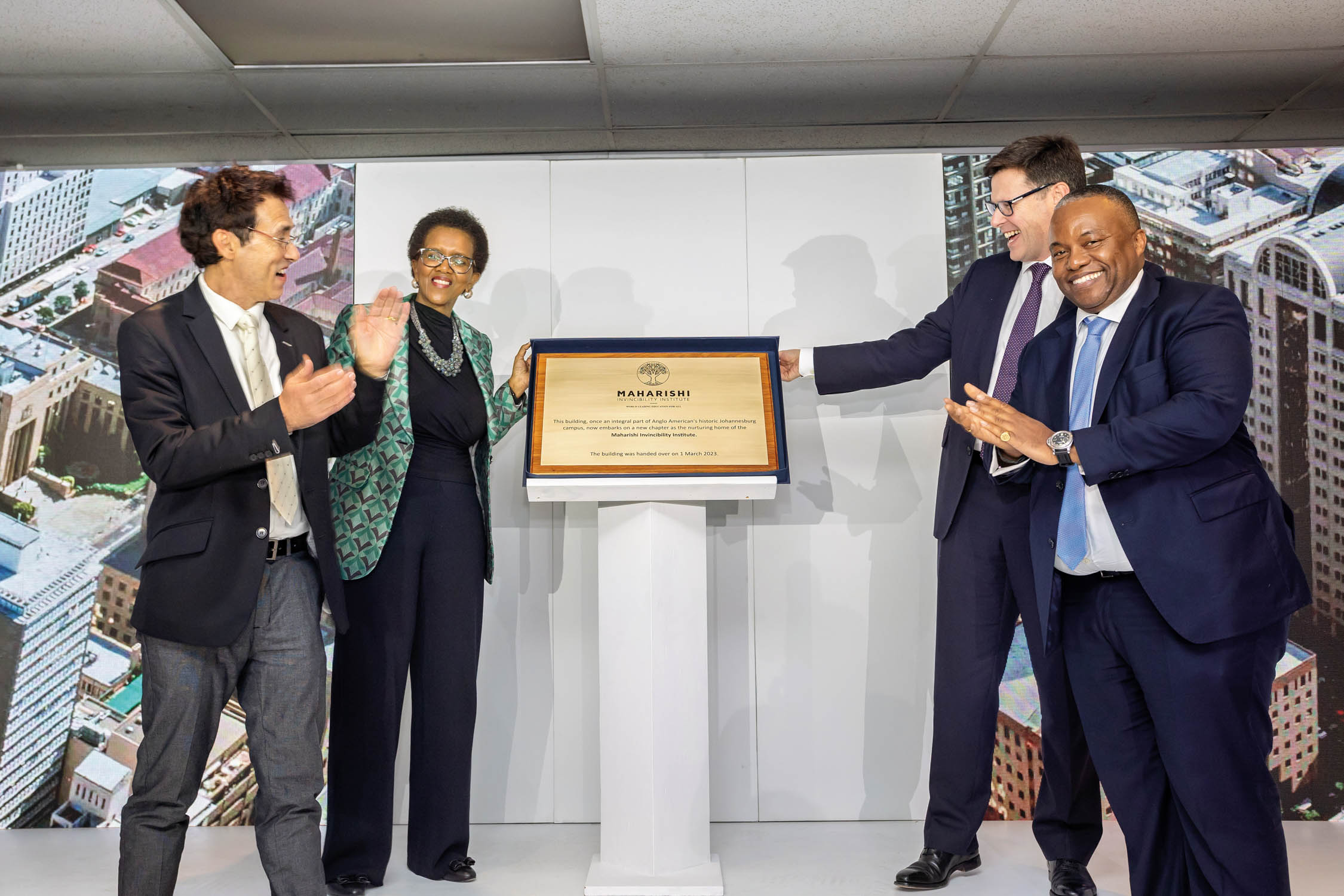
Anglo American’s South Africa office had been at 45 Main Street in Johannesburg for many years . When the company relocated north of the city in 2021, universities and corporations made substantial offers to purchase the building, with some bids higher than 100 million rand (five million dollars).
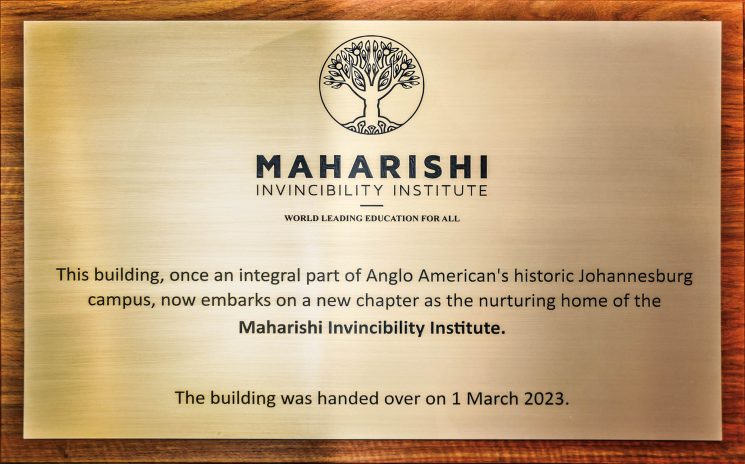
But Anglo American decided to donate the building to MII, enabling MII expand its educational and outreach work and allowing more graduates to secure jobs with international corporations based in South Africa and nearby countries.
In making this gift, Anglo American reaffirmed its commitment to both education and the revitalization of downtown Johannesburg.
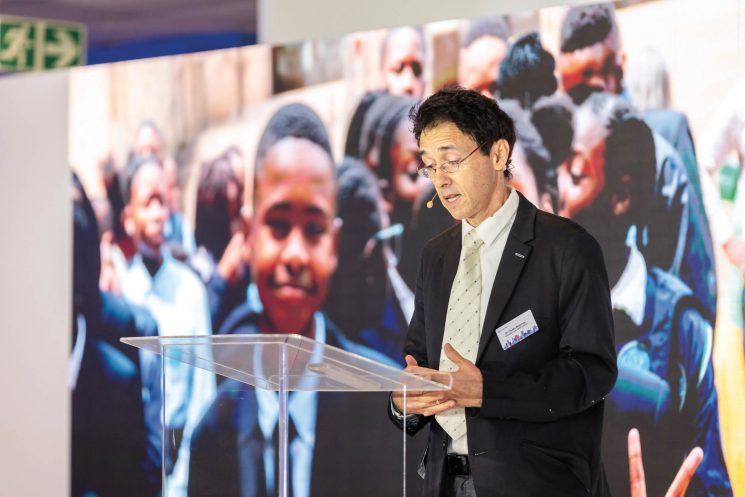
“We firmly believe that Johannesburg’s inner-city regeneration hinges on nurturing the potential of its young people, who represent the city’s future,” said Nolitha Fakude, Chairman of Anglo American’s Management Board, in announcing the transfer. “The Maharishi Invincibility Institute has emerged as a driving force in paving pathways to opportunities for thousands of young people, and it fills us with great pride to entrust them with the custodianship of the iconic 45 Main Street — a building that holds deep historical significance in Johannesburg’s evolution.”
Taddy Blecher, CEO of Maharishi Invincibility Institute, praised Anglo American for its foresight in donating the building to MII and for its commitment to both education and revitalizing the business district.
“If more companies, organizations, and the government come together to tackle the city’s challenges, we can secure a more productive future for all,” Blecher said. “By entrenching ourselves in the central business district, MII will play an active part in making the inner city safer and a more attractive place to live, work, and thrive.”
“MII will play an active part in making the inner city safer and a more attractive place to live, work, and thrive.”
— Taddy Blecher
“It’s truly inspiring to see the Maharishi Invincibility Institute and other organizations joining hands with us, ready to roll up their sleeves and work together,” said Themba Mkhwanazi, Anglo American’s Regional Director for Africa and Australia. “This collaboration is not just about uplifting the inner city but is equally focused on stimulating socio-economic development and tackling our youth unemployment crisis. Together, we aim to create a better future, where the inner city becomes a safer, thriving, empowering place for all its residents — particularly its young people — brimming with opportunities for growth and prosperity.”
A history of educational innovation and success in collaboration with MIU
Maharishi Invincibility Institute is a non-profit South African skills-to-work educational institution.
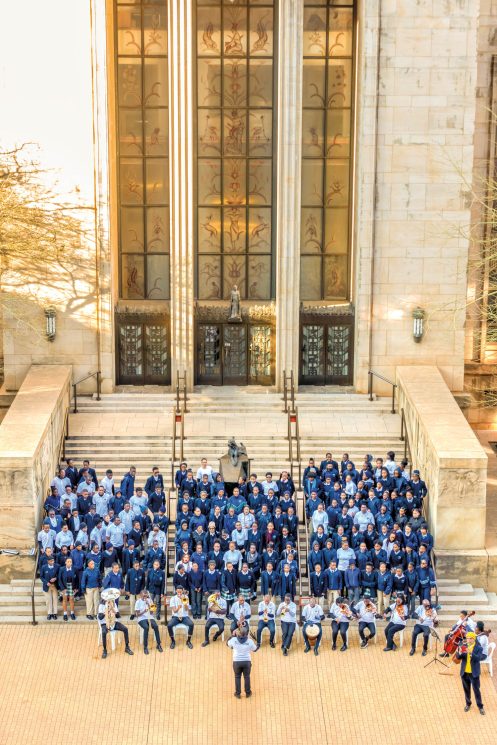
Since its founding in 2007, the Institute has provided critical scarce-skills job training to 24,000 South African youth and placed 21,000 in jobs. These numbers include students who have received bachelor’s degrees in business and MBA degrees, 5,000 who have trained as entrepreneurs, and many thousands who have taken shorter one-year programs.
The bachelor’s in business students receive their degrees from MIU, which teaches more than half the business curriculum.
The MBA degrees are also from MIU, and those students come to MIU in Fairfield to do their work-study. Some of the MII staff have also earned MBAs from MIU.
MII has a better than 90% success rate in placing its graduates in high-quality, sustainable jobs.
And it has established a dynamic, focused, and peaceful learning environment that helps unfold and develop a student’s full potential.
Stanford University recently selected MII as one of the twelve most innovative schools in the world in its “2025 Guide to Reimagining Higher Education.”
Simultaneously, MII is helping to reinvigorate the Johannesburg city center through its work with civic partners there.
Goal: 5,000 students
The value of the Anglo American donation is over 200 million rand (ten million dollars), including 30 million rand spent in refurbishing the 45 Main Street building. This beautiful facility requires only some classroom setup for the high school and a few of the specialist academies to function as an educational institution.
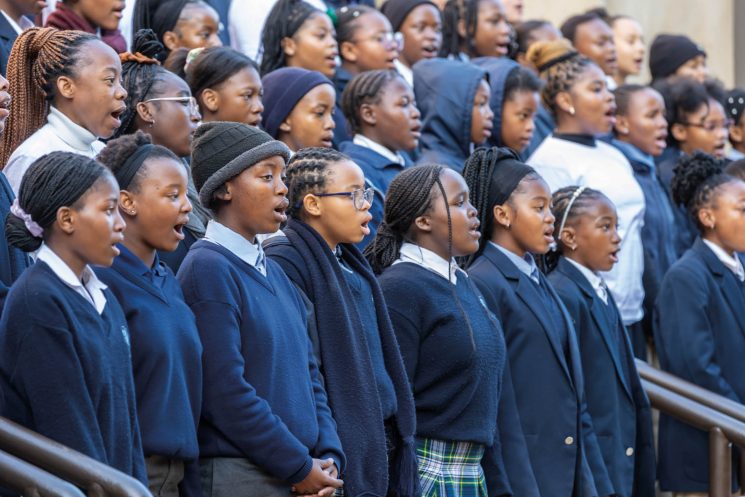
Enrollment is expected to grow to 5,000 students over the next three to five years.
MII will recruit students from across South Africa and the rest of Africa. For its high school, MII will recruit from Johannesburg itself.
As part of this growth, MII plans to hire between 120 and 200 staff and faculty, many of whom will come from within the ranks of MII’s enthusiastic graduates.
In combination with their two existing buildings, which Anglo American donated some years ago, MII’s total real estate in Johannesburg has reached nearly 650,000 square feet — more than enough space to handle their enrollment goals.
MII is also seeking grant funding and philanthropic support to ensure that its educational programs can be sustained.
With such a powerful educational presence in Johannesburg, MII administrators have renamed their section of the city “Education Town.”
In recent years, several large corporations have relocated their headquarters from Johannesburg to northern suburbs and cities such as Rosebank and Pretoria, diminishing the inner city’s vitality. But the promise of 5,000 full-time students studying in the city every day will create a compelling foundation for city enrichment and a stronger educational culture, a new facet for Johannesburg.
Like most urban areas, the city business district is home to a wide range of institutions — business, financial, governmental, and legal, as well as residential areas. MII is working closely with its civic partners, spearheading initiatives such as street cleaning and streetlight installation, to increase security, safety, and peace in the city.
Expansion beyond Johannesburg and South Africa
Maharishi Invincibility Institute established a school in Durban in 2015 and another in Cape Town in 2021. MII Cape Town focuses on cybersecurity technology programs in conjunction with a large bank.
A high school has been established in neighboring Zimbabwe — the Maharishi Invincibility School — and a college has just started there as well.
And a Maharishi Invincibility Institute has started in Brazil, also focused on cybersecurity training.
Impact of Consciousness-Based education
Historically, leading universities typically accepted students from privileged backgrounds and with top grades, who would graduate and enter the workforce even more privileged.
“At MII, we are demonstrating that every person has genius within and is worth nurturing,” Blecher explains. “Our incoming students are largely from marginalized families, and the vast majority are unemployed when they join us. Some are asylum seekers or refugees from other African countries. Seventy percent of our student population would be ineligible to attend conventional universities. Over sixty percent come in with some form of post-traumatic stress disorder and around forty percent suffer from depression.”
MII’s educational philosophy inverts Maslow’s hierarchy of needs, elevating purpose and self-actualization as the primary needs to be met. This supports people in fulfilling traditionally basic needs like economic security.
MII promotes what Blecher calls “inside-out learning,” not “outside-in.” The curriculum is holistic and consciousness-based. Students take part in group TM and TM-Sidhi practice daily, developing their inner creative intelligence. MII combines this with online learning customized to students’ varying levels of academic preparedness.
MII also focuses on leadership and career preparation, with outstanding results. “MII graduates are hired at well-paying, full-time jobs, and they’re very successful as entrepreneurs too,” Blecher says. “With the right kind of education, people can develop so much more of their full potential — an extraordinary and beautiful outcome.”
“With the right kind of education, people can develop so much more of their full potential — an extraordinary and beautiful outcome.”
— Taddy Blecher
Blecher points out that the greatest opportunity for human growth is no longer on the side of academic content and learning technologies, which are expanding at a phenomenal rate.
Far more important is giving students a means to increase their learning ability and develop their full potential. In that respect, the TM and TM-Sidhi programs, founded by Maharishi Mahesh Yogi, are game-changers for education.
“MIU has been the anchor of everything we have been able to achieve,” Mr. Blecher said. “We are deeply grateful for MIU’s steadfast support since 2010, especially through its business degree program, and we look forward to many more successful collaborations in other parts of the world.”
MIU has received another annual round of grants from the Wege Foundation — six grants totaling $400,000. This is the tenth consecutive year the university has received these grants, and this year’s grants bring the total support from the Wege Foundation to $4,086,139.
“We appreciate this extraordinary support from the Wege Foundation so very much,” said MIU President John Hagelin. “The many grants we have received over the past ten years have reached every corner of the university and touched and uplifted everyone here, students, staff, and faculty alike.”
This year’s Wege Foundation grants
$150,000 – Faculty, Staff, & Student Comprehensive Development Program
This grant, now in its eighth year, supports a wide array of activities, including faculty research, publication, conference participation, and other academic support; faculty and staff training; student activities; and the annual Wege Awards, given to outstanding faculty and staff and which have become a year-end highlight at MIU.
“This year, a portion of this grant will also be used to complete the renovation of part of the Fairfield IT & Business Park to accommodate faculty, staff, and student TM retreats,” President Hagelin said. “This is the highest form of development we can provide to people.”
$75,000 – Wege Fellowship for the Arts
This grant, now in its third year, supports merit-based scholarships for the MFA in Visual Art, which have attracted talented students.
$70,000 – Faculty and Staff Multi-Purpose Support
This grant will support long-time faculty and staff in their transition to retirement.
$70,000 – Enrollment Growth Support
This grant will support the Admissions Office, specifically expenses related to Slate, our customer relationship management platform, as well as staff training and operational streamlining projects.
$20,000 – MIU Campus Ayurveda Clinic
This grant will underwrite general physical improvements in the Maharishi Panchakarma Clinic, housed in the Doshi Center for Integrative Health and Maharishi AyurVeda, to provide enhanced experience for both clients and staff.
$15,000 – Annual Fund
The Annual Fund provides unrestricted support for the operating budget.
About the Wege Foundation
The Wege Foundation, based in Grand Rapids, Michigan, was founded in 1967 by Peter M. Wege, chairman of Steelcase, Inc. Known for his compassion and generosity, Peter Wege was also passionate about preserving the environment. His motto: “Do all the good you can. For all the people you can. For as long as you can.”
Wege Foundation grants have supported the extensive renovation of the Wege Center for the Arts, Dr. Hagelin’s innovative research on dark matter, research on the Maharishi Effect, MIU’s MEG’Array Solar Power Plant, the Schwartz-Guich Sustainable Living Center, faculty art exhibits, student field trips, locally-grown organic food for the dining hall, the endowment fund, faculty and staff service awards, and more. Wege Foundation grants have also contributed substantially to Maharishi School, the K-12 school on the MIU campus.
Banner photo – Downtown Grand Rapids by Rachel Kramer, licensed under CC BY 2.0. From the Wege Foundation home page.
